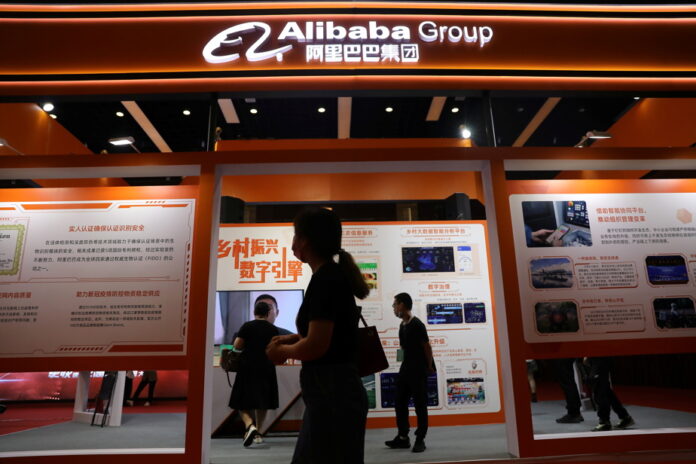(Beijing) Chinese e-commerce giant Alibaba announced a much larger-than-expected rise in quarterly revenue on Thursday, despite China’s economic slowdown weighing on consumption and several difficult years.
Alibaba is a key player in the digital economy in China and a pioneer in the generalization of purchases on the Internet in its country.
The group is therefore considered a barometer of consumption in its country.
China entered deflation on Wednesday for the first time since 2021, the latest sign in a long string of indicators to reflect a slowdown in the world’s second-largest economy.
Despite the economic situation, the group achieved 234.1 billion yuan (43.4 billion) in sales in the first quarter of its staggered fiscal year, up 14% year-on-year and higher than forecasts for analysts.
By comparison, Alibaba’s revenue grew only 2% over the previous period between January and March, to 208.2 billion yuan (38.6 billion).
Its net profit increased by 51% over one year, to 34.3 billion yuan (6.3 billion) for the April-June period.
These results come as Alibaba embarks on the biggest restructuring in its history.
It provides for the division of the group into six distinct entities with the ambition of being able to list them on the stock exchange separately.
And the internal replacement of its CEO Daniel Zhang, a historical figure in the company.
“Our reorganization is beginning to unleash new vitality,” said Daniel Zhang in a statement, hailing a “robust quarter.”
Daniel Zhang, at the head of the Alibaba empire since the departure in 2019 of its founder Jack Ma, is due to take over the management of the lucrative cloud computing branch, now a separate entity, in the coming weeks.
In addition to this activity and e-commerce, the Hangzhou group is present in logistics, but also media, entertainment and artificial intelligence.
These changes come after several years of turbulence for tech in China, marked by the authorities taking control of a powerful sector that was then poorly regulated.
Alibaba had been in 2020 the first company to suffer the vengeance of power.
The authorities then stopped in extremis what should have become one of the biggest fundraisers in history ($34 billion) for its former subsidiary Ant Group, owner of Alipay, a telephone payment system. very popular in China.
The following month, Alibaba was investigated for impeding competition, then fined a hefty $3.4 billion.
These measures had marked the beginning of a brutal tightening of regulations in the technology sector, which had severely penalized the profitability of the digital giants.
Last month, the regulator fined Ant Group 7.1 billion yuan (about $1.3 billion) for breaches of banking regulations.
Its competitor Tencent, also essential for payments via its messaging application WeChat, was fined nearly 3 billion yuan (about 560 million dollars).
These convictions seem to have marked the epilogue of the sector’s setbacks.
After mishandling it, the Chinese government is now reaffirming its support for the digital economy, an important source of growth and potential jobs, at a time when the economy is under pressure.
But the sector has not yet regained its former dynamism.
Sign of the difficulties, the workforce of Alibaba shrunk by more than 17,000 employees, according to a comparison with the same quarter of last year.















